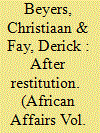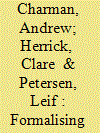|
|
|
Sort Order |
|
|
|
Items / Page
|
|
|
|
|
|
|
| Srl | Item |
| 1 |
ID:
139636


|
|
|
|
|
| Summary/Abstract |
This article considers the fracturing of “community” and the turn to litigation in the wake of nominally settled land restitution claims in South Africa. We describe emergent incongruence between groups of claimants, the projects of restitution, and the new legal entities that represent the claimants. As a result, discontented South African land claimants are challenging the new legal entities created in the restitution process, rather than the state and private sector actors upon which development-oriented Settlement Agreements depend. We focus on two of the earliest and largest land claims involving urban land and protected areas, District Six and Dwesa-Cwebe, but our argument extends beyond these cases. We then consider the implications of increased claimant litigation for the governance of relations between claimants and the state, and the management of dissent in the context of neo-liberalization. In concluding, we argue that struggles among claimants undermine the potential for more concerted action to address the shortcomings of restitution.
|
|
|
|
|
|
|
|
|
|
|
|
|
|
|
|
| 2 |
ID:
147819


|
|
|
|
|
| Summary/Abstract |
Ideological affiliations like Africanism, charterism, and Black Consciousness shaped the political boundaries of student and youth political groups in South Africa during the tumultuous 1980s, and continue to inform contemporary youth politics. These delineations have also been used in the secondary literature to understand organizational competition and when considering how young activists negotiated contested political ground. However, this article suggests that the boundaries between opposing organizations were often blurred by their overlapping use of competing ideologies. It further argues that these divisions, although articulated ideologically, were rooted in organizational affiliation and competition for political influence and territory. It analyses the ideological development of the Congress of South African Students, the Azanian Students’ Organization, and the South African Youth Congress, and tracks the changing scope for ideological expression within charterist student and youth formations. It suggests that during the 1980s the scope for differing ideological expression narrowed, and links this process to the ANC's efforts to establish hegemony within the charterist movement. The article argues that this history is important in order to understand the ideological ‘unruliness’ or flexibility of the ANC Youth League after apartheid and the rise of Julius Malema's Economic Freedom Fighters, and considers how ideological difference within youth politics is beginning to be expressed outside the fold of charterism.
|
|
|
|
|
|
|
|
|
|
|
|
|
|
|
|
| 3 |
ID:
141070


|
|
|
|
|
| Summary/Abstract |
In early 2012, South Africa's Western Cape Province enacted new alcohol control legislation amid mounting concern with the costs of alcohol-related harms. This has focused on urban shebeen closure to control the informal, unlicensed trade and the harms it generates through crime, violence and injury. In contrast to policy discourse, this paper contends that rather than existing outside regulation, the city's shebeeners embrace multiple (self and collective) regulatory strategies to manage the inherent risks of their own informality. Drawing on novel empirical data including a ‘business census’ and interviews with the police and liquor traders across four Cape Town case study sites, the paper adds new depth to contemporary engagements with the appropriate and equitable regulation of the South African informal liquor trade.
|
|
|
|
|
|
|
|
|
|
|
|
|
|
|
|
|
|
|
|
|